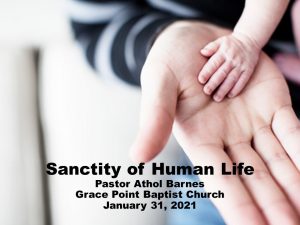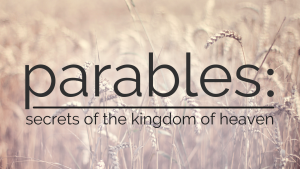
Psalm 8
Do you know your net worth?
What if I told you that your net worth is infinitely more than you can imagine?
It may shock you that in America today there is an abortion every 96 seconds, or 2362 Lives taken every day. As tragic as that is, there is a sinister and extremely worrying shift that has taken place in our world today. With an increase in atheism and godless narcissism, life is under attack at both ends of the spectrum, the unborn, the elderly, and even the disabled.
When it comes to the sanctity of life, Psalm 8 has a poignant message for us. No other Psalm draws attention to the dignity and value of mankind as this one. It begins and ends with worship, placing God the creator of all things, at the place of ultimate worship and glory.
In verse 2, the Psalm then takes a sharp turn, from the glory and majesty of God, to the weak and helpless babies and infants. Of all the scriptures speaking to the sanctity of human life, this one gives us the clearest evidence of why Satan is on a mission to destroy the unborn. Abortion is not a decision regarding freedom of choice, it is a war against the giver of life Himself.
Jesus himself quoted this verse in Matthew 21. He had just cleared the temple of the money changers and the traders, there was pandemonium, and the children were running around the temple shouting, “hosanna to the son of David!”. The chief priests are furious, but Jesus simply quotes this verse and leaves.
There is tremendous power in the prayer and praises of innocent children. If you are struggling to pray, invite your children into the prayer time. There is power in the praises of children to break down spiritual walls of opposition. Satan quakes at the sound of children praying.
In 2007 we took a mission planning trip to Philadelphia as a family. Joshua was ten days old at the time. On one of the days, we decided to visit some historic sites and took the tour of Independence hall, the room where the declaration of independence was adopted on July 4th, 1776. As we were listening to the tour guide, he wanted to find the youngest person in the room. Joshua was by far the youngest and Debbie took him to the front. As he looked at Joshua, he made his point, “here is the person in the room with the greatest potential”.
At the time we thought his statement was quite special, but Joshua’s life has been filled with challenges. He has Autism, Epilepsy, and a host of other diagnoses. On two occasions, we have sat at his hospital bed, not sure if he was going to wake up.
Today, does Joshua still have that potential?
We say, “absolutely”, the fact that the enemy tried to destroy him, points to the fact that God has a special calling and purpose for his life. Every life is valuable and has unlimited potential when given over to the calling and purposes of God.
The Psalmist then goes back to gazing at the magnificence of the universe – the general revelation of God (Psalm 8:3-4). If you are struggling to worship and encounter God in your daily life, take a few minutes on a cloudless night and look up at the sky. Within a few moments you will be worshipping as you see a glimpse of the magnificence of God.
The next two verses of the Psalm seem jarring considering the world we live in today. Some educators and environmentalists tell us that the world would be perfect, if only mankind was eliminated. According to them, man is the problem, the weak link in the order of things.
Considering what we see in Hebrews 2, we know that Psalm 8, is a messianic Psalm. Verses 5 and 6 find their fulfillment in Jesus. When Jesus died and rose again, God put all things under his authority (Hebrews 2:8).
It was God’s original plan in Genesis chapter 1 for mankind to have dominion over creation.
But when Adam sinned, he lost that dominion. The original sin damaged the original design. Instead of being a king, mankind has become a slave.
When Jesus came, he began to show us the original design of God. Jesus displayed in many miraculous ways, the power and dominion that he has over creation, by calming storms, commanding fish, walking on water, multiplying food and much more. The fact that Jesus died and rose again, is all the assurance we need that one day, when he returns, his people will reign over a renewed earth. Jesus is the firstborn of the new creation; he has the first resurrected body that is incorruptible and eternal.
What makes mankind so incredibly valuable, is that we are created in the image of God and as followers of Jesus, we have been adopted by God and have become co-heirs with Christ. God places no greater value on any other part of creation.
Post-modern teaching has lowered man to an animal and rejected the image of God in creation. All around us, we are seeing the effects of this because we don’t see human beings as being created in the image of God.
Whenever you are tempted to gossip or speak angrily to someone, remember they are created in the image of God. Next time you are tempted to dismiss someone or look down on them for their dress or personal decisions, remember that they are created in the image of God and God views them with incredible love and value.
This applies to all people, the unbeliever, the criminal, the homosexual, the disabled, the elderly, those suffering from Alzheimer’s or any other debilitating illness, it does not matter. God puts priceless value on every human being. Even those that the world says are of no value.
The value of something is based on the price someone is willing to pay for it.
How much is someone willing to pay for you?
Your creator has demonstrated your value (Romans 5:8).
Jesus gave his life for you and he redeemed you. The cost of your redemption was the perfect priceless spotless lamb of God.
You are infinitely valuable (1 Corinthians 6:19-20).
How does this fact change the way you view yourself and the people in your life?


